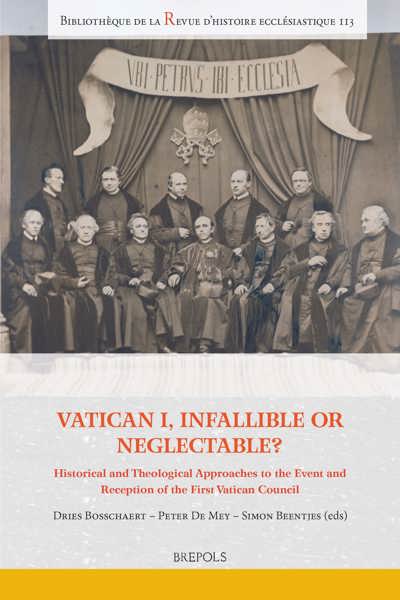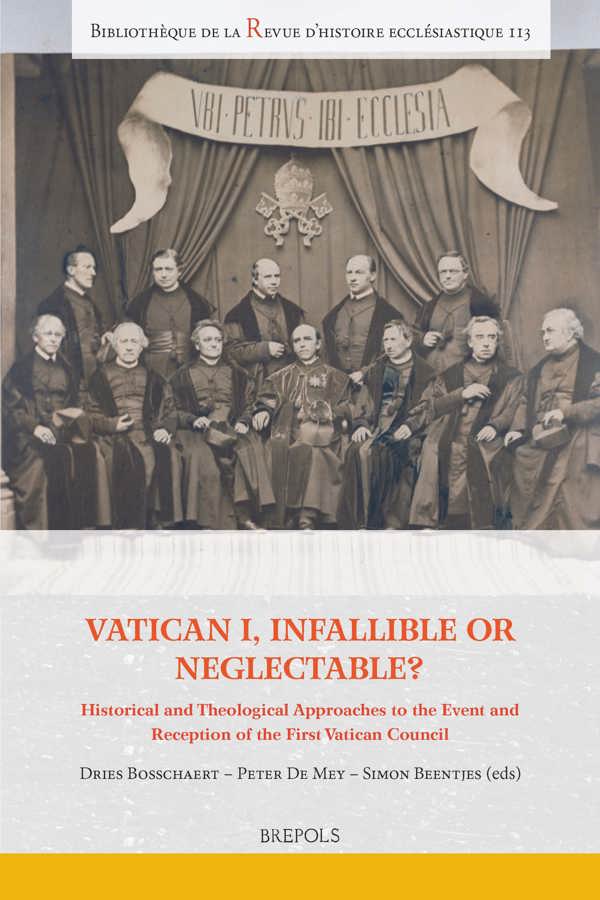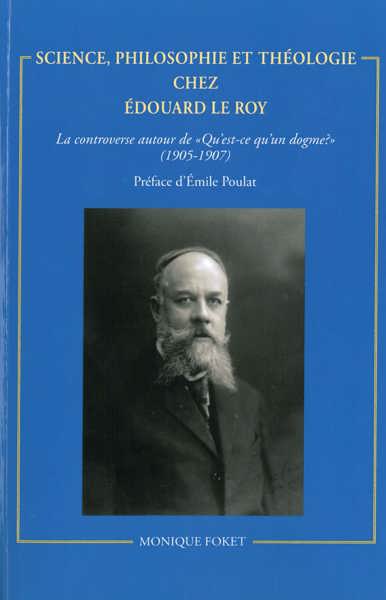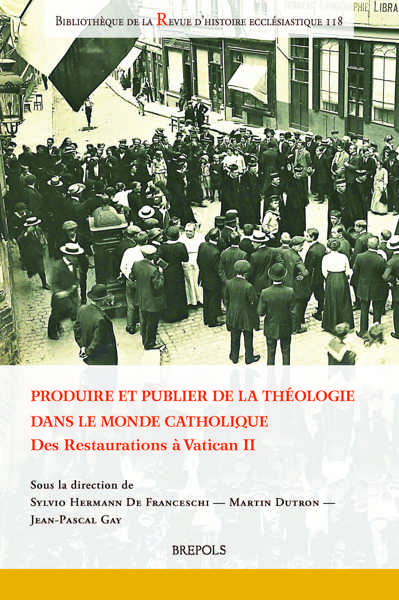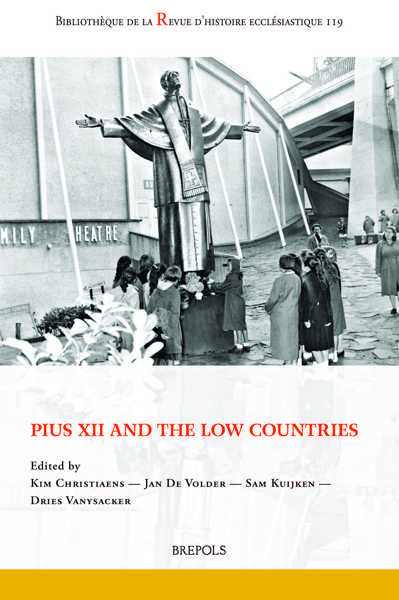
Vatican I, Infallible or Neglectable?
Historical and Theological Approaches to the Event and Reception of the First Vatican Council
Dries Bosschaert, Peter De Mey, Simon Beentjes (eds)
- Pages: 348 p.
- Size:156 x 234 mm
- Language(s):English, French
- Publication Year:2023
- € 99,00 EXCL. VAT RETAIL PRICE
- ISBN: 978-2-503-60171-7
- Paperback
- Available
- € 99,00 EXCL. VAT RETAIL PRICE
- ISBN: 978-2-503-60172-4
- E-book
- Available
"Overall, this multifaceted collection is commendable for providing genuinely new insights in some aspects is to be commended. It clarifies the tension between maximalist and minimalist interpretations during and after the Council. In contrast to the Council itself, the papal curia also tolerated minimalist interpretations after the Council, which only made further development of Vatican II's ideas possible." (Klaus Unterburger, in The Catholic Historical Review, 110/3, 2024, p. 600)
"Su enfoque interdisciplinar, combinado con un análisis equilibrado, hace de este libro una referencia muy buena sobre el concilio Vaticano I y su legado." (Diego M. Molina, in Archivo Teológico Granadino, 88, 2025, p. 234)
Dries Bosschaert is assistant professor at the Research Unit History of Church and Theology at the Faculty of Theology and Religious Studies, KU Leuven. His research focuses on the history of European Christianity and identity debates in the long 20th century, including religious identity making and the Second Vatican Council. He is coordinator of the Leuven Centre for the Study of the Second Vatican Council. He is KU Leuven’s PI in the European Commission’s ESFRI Research Infrastructure RESILIENCE.
Peter De Mey is full Professor of Roman-Catholic ecclesiology and ecumenism at the Research Unit Systematic Theology and the Study of Religions, Faculty of Theology and Religious Studies, KU Leuven. He is involved in the Centre for Ecumenical Research, the Centre for the Study of the Second Vatican Council, and the Louvain Center for Eastern and Oriental Christianity (LOCEOC). He is a member of the Board of the National Commission for Ecumenism (and its president since 2010) and co-president of the Dialogue Commission with the United Protestant Church in Belgium.
Simon Beentjes is a doctoral researcher at the Faculty of Theology and Religious Studies, KU Leuven, where he is a member of the Research Unit Systematic Theology and the Study of Religions. He obtained a Master’s Degree in History at Leiden University (2019) and a Master’s Degree in Theology and Religious Studies at Tilburg University (2020). In his doctoral project, he focuses on theological renewal and more specifically Catholic ecclesiological renewal in the pioneering ecumenical activities in advance of the Second Vatican Council.
On 20 October 1870 pope Pius IX adjourned the First Vatican Council, because of the Italian Rissorgimento troops approaching the city of Rome. Given that the Council had only opened less than a year prior, on 8 December 1869, the act was emblematic. The council, as the Catholic Church’s protective response against all things new – rationalism, liberalism, naturalism, materialism, and pantheism – was overtaken by history. Given its premature end not all documents prepared were completed and those that were promulgated, became among the most controversial documents in the nineteenth and twentieth-century Catholic Church, strongly defining its relations to other Christian confessions and modernity. Similarly, around one hundred years after the suspension of the First Vatican Council its historical and theological study was overtaken by the event of the Second Vatican Council, known for its rapprochement to the modern world. The history and results of the First Vatican Council were either forgotten or reinterpreted in light of this subsequent council’s decisions. In light of the 150th anniversary of this council, the editors and authors of this volume set themselves the goal of re-examining this tradition of historical and theological reception (and forgetting) of the First Vatican Council.
Vatican I, Infallible or Neglectable?
Historical Perspectives on the Event and Reception of the First Vatican Council
Edited by Dries Bosschaert, Peter De Mey, and Simon Beentjes
Introduction
Dries Bosschaert, Peter De Mey, and Simon Beentjes
Part I: The History of Vatican I and its Main Actors
The Holy See, Church and Politics
The Climax of Vatican I (1864-1876)
Andrea Ciampani (LUMSA di Roma)
Victor Dechamps, Archbishop of Mechelen (Belgium), on the Eve of the First Vatican Council
Dries Vanysacker (KU Leuven)
Des évêques de juste milieu.
Le cardinal Mathieu et la minorité inopportuniste
Vincent Petit
‘Ein Mann mit eiserner Natur’:
Archbishop Peter Kenrick, Vatican I, and his Submission to Pastor æternus
Kenneth L. Parker (Duquesne University)
Ignaz von Döllinger and the First Vatican Council
Franz Xaver Bischof (Ludwig Maximilians Universität München)
The First Vatican Council and the Faculty of Theology at Louvain
Leo Kenis (KU Leuven)
Russian Diplomats on Vatican I
Papal Infallibility, the Emergence of ‘Parties’ and Concerns on Catholic Clergy in the Empire
Katsiaryna Kimlenka (Lomonosov Moscow State University)
Part II: Reconsidering the Doctrine of Vatican I
Catholic Socio-Economic Thought in the 1860s and its Impact on Vatican I
Alina Potempa (Humboldt-Universität zu Berlin)
‘Ecclesiam esse corpus Christi mysticum’
Supremi Pastoris, Clemens Schrader and the Ecclesiology of the Mystical Body
Valfredo Maria Rossi (Pontifical Gregorian University)
Joseph Kleutgen and the Second Schema De Ecclesia
Infallibility and the Minor Theological Censures
John P. Joy (Albert the Great Center for Scholastic Studies)
John Henry Newman, Vatican I and the doctrine of Papal Infallibility
Cautions and Contributions
Mary McCaughey (St. Mary’s College Oscott)
The Blessing that comes from “Anathemas”
The Traces of Hope that emerged in Vatican I
Susana Vilas Boas (Universidade Católica Portuguesa)
Part III: Receptions of Vatican I
The First Vatican Council and Anglicanism
Mark D. Chapman (University of Oxford)
The Reception of the First Vatican Council in Old Catholic (Ecumenical) Theology
Peter-Ben Smit (Vrije Universiteit Amsterdam)
Infallibility in Perspective
The Different Receptions of Pastor Aeternus among Catholic Ecumenists before the Second Vatican Council
Simon Beentjes (KU Leuven)
La primauté dans les conciles du Vatican
Réception ou rupture ?
Fermina Alvarez Alonso (Pontificia Universitas Lateranensis)
The Trinitarian Theology of Bernard Lonergan
An Example of the Reception of Vatican I in 20th-Century Theology
Andrew Downie (Durham University)
Can the Clock be Turned Back?
Understandings of Tradition and Change in Vatican I’s and Vatican II’s Responses to the Modern World
Kristin Colberg (College of Saint Benedict)
